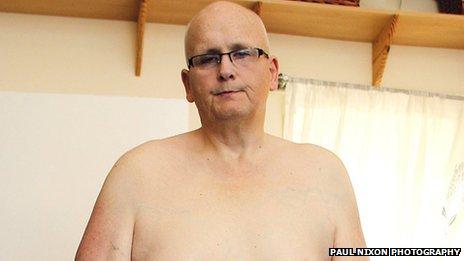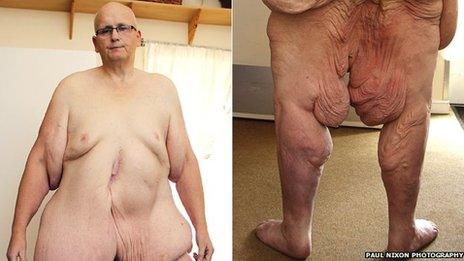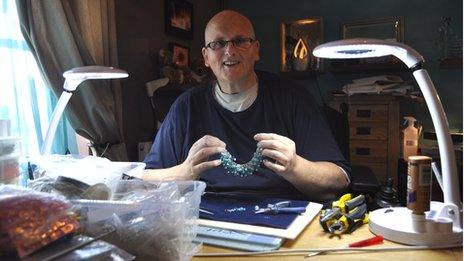Paul Mason: Excess skin plea from man once labelled world's fattest
- Published

Paul Mason says he has an "extreme amount" of loose skin that needs removal
A man once labelled the world's fattest has released naked photographs of his body to warn others "how bad things can get" and to plead for medical help.
At his heaviest, Paul Mason weighed 70 stone (444kg) and was confined to the bed of his bungalow in Ipswich.
He now weighs about 24 stone (152kg) but says he will be "stuck in limbo" until the excess skin is removed.
"I want health professionals to have a look and think 'it's about time we helped this chap'," he said.
Mr Mason, 52, who had gastric bypass surgery in 2010, says his "goal weight" is 15 stone (95kg).
'Skin splitting'
He said about eight stone (50kg) would be lost if he could have the three operations he needs to remove loose skin around his midriff, legs and under his arms.
"Around my middle and on my legs the skin keeps splitting because of the weight of it," Mr Mason said.
"I've got myself a little bit of independence and want to carry that on to where I don't need a wheelchair to get around."

Mr Mason said some people might find the images shocking
He said he decided to undress for the photographs because he had given up hope of the NHS offering him the surgery, which he says could cost more than £60,000 in total.
"I wonder if it will ever happen now," he said. "I met a lady the other day who has been waiting 13 years and she's only got about two stone of loose skin to be removed."
The NHS says Mr Mason has to have a stable weight for two years before the skin removal operations can be considered.
Mr Mason said he had never seen "proper photos" of the back and front of himself and admitted that some people might find the images "shocking".
"I wanted people to see the issues that can happen to your body, to your skin, when you put an extreme amount of weight on," Mr Mason said.
"A lot of people think that's just going to shrink back, but it doesn't.
"If people find it shocking, perhaps they will think twice that they mustn't get themselves in that state."
Samantha Scholtz, a consultant liaison psychiatrist working in the bariatric (treatment of obesity) service at St Mary's Hospital in west London, said excess skin was an issue for a lot of patients.
'Self-image'
"It's an under-recognised issue and something patients before going to surgery aren't always informed about," she said.
"Although health is the main motivator for seeking surgery, I think the cosmetic appearance does come into it.
"It certainly affects their quality of life, self-image and their ability to form relationships."
Ms Scholtz said she could not comment on Mr Mason specifically, but said it would be "unfair" to allow a patient to wait two years for an operation if that person was suffering from other complaints such as tears to the skin.
But she added it was important for patients to get to a "stable weight" before having the skin removed.
"If they are still losing weight they will be left with more excess skin," she said.
The NHS Ipswich and East Suffolk Clinical Commissioning Group said decisions about surgery were taken in the "best interest" of patients.
"In cases like this the NHS has a panel of people, including clinicians, who decide whether the patient should have such an operation," a spokesperson said.
"A patient must have a stable weight before he or she is considered."
- Published26 December 2012

- Published6 December 2011
.jpg)